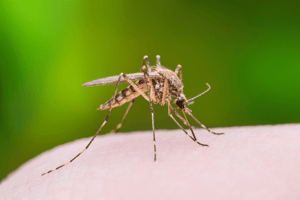Mosquito Control in Dallas, TX
Overview
 Mosquitoes can just ruin your day. Whether you're working in your yard in the summer, or hosting a get-together on the patio, swarms of mosquitoes can put a damper on your outdoor activities. And it's not just about batting away biting, whining insects from your face and limbs; these days, we have to be on guard against dangerous diseases.
Mosquitoes can just ruin your day. Whether you're working in your yard in the summer, or hosting a get-together on the patio, swarms of mosquitoes can put a damper on your outdoor activities. And it's not just about batting away biting, whining insects from your face and limbs; these days, we have to be on guard against dangerous diseases.
Here are some things to think about as you combat mosquitoes on your property.
Types of Mosquitoes
There are numerous species of mosquitoes. Some are native to our country , and some have been brought here as a result of global commerce.
One particularly aggressive breed, the Asian tiger mosquito (Aedes albopictus), is known for biting in broad daylight. The Asian tiger mosquito is a carrier of Zika virus (a severe, flu-like illness) although the Center for Disease Control (CDC) reports no known occurrences of Zika thus far in the U.S. The Asian tiger is closely related to Aedes aegypti, also a carrier of Zika, dengue fever and chikungunya virus.
About 174 mosquito species are found in the U.S. and Mexico, the most common, besides the Aedes species, being the yellow fever mosquito, the house mosquito and the southern house mosquito.
Appearance
Here's how some of the most common species look:
- Aedes spp. A. aegypti and A. albopictus are both black with white specks.
- House mosquito, including Culex pipiens and Culex resuans Theobald. Cx. pipiens is brown with white stripes and is the mosquito you most often find in standing water. C. restuans looks similar, but proliferates more in the eastern and central regions of the U.S.
- Southern mosquito, or Culex fatigans. This mosquito is more common in tropical and sub-tropical regions such as Florida. It's similar in appearance and behavior to the house mosquito, and like them, is a night-time feeder.
Habitat
Mosquitoes need standing water where females can lay their eggs. After hatching, the larvae feed on vegetative matter in the water. The larvae progress through moltings to a pupal stage, then go on to the adult stage -- a period of five to 14 days. Soon after reaching adulthood, mosquitoes can fly. The females bite and feed on warm-blooded hosts to provide food for their eggs.
Mosquitoes, which are found everywhere except Iceland and Antarctica, linger in shrubbery and vegetation out of the sunlight, or hide under leaves and under bark to escape rain.
Besides laying eggs in natural pools of standing water found in drainage basins, swamps, flood plains and other natural areas, mosquitoes may seek bird baths, water dishes, backyard ponds and items such as an old tire that can collect rain water.
Damage
The main problem with mosquitoes, besides causing itchy welts to appear on our skin, is the potential for exposing us to various diseases. In the U.S., West Nile virus is the most common disease that mosquitoes can carry, followed by these, in order of occurrence:
- Malaria
- Chikungunya virus
- Dengue fever
- Unspecified California serogroup viruses
- St. Louis encephalitis virus
Yellow fever virus has not been found in this country in many decades but there are concerns that with global travel, it may return to the U.S. by means of A. aegypti, which also spreads Zika virus.
Besides transmitting diseases to humans, mosquitoes also carry viruses that can sicken and kill wildlife and domestic animals, including horses and dogs. Heart worm disease, which is caused by a parasite transmitted during a mosquito bite to the dog, is a deadly killer and crippler of canines.
Exclusion
 One of the best ways to control mosquitoes is to eliminate standing water from your property. If you have a pond, make sure the water is aerated and moving around. You can also treat ponds with a biological pesticide (safe for children and pets) or stock the pond with mosquito-eating fish. Eliminate algae (that's mosquito larva food!) in the pond with an herbicide.
One of the best ways to control mosquitoes is to eliminate standing water from your property. If you have a pond, make sure the water is aerated and moving around. You can also treat ponds with a biological pesticide (safe for children and pets) or stock the pond with mosquito-eating fish. Eliminate algae (that's mosquito larva food!) in the pond with an herbicide.
Other means of control:
- Light citronella candles during outdoors events.
- Make your yard safe from cats so insect-eating birds and bats will visit.
- Plant insect-repellent plants such as basil, citronella grass, lavender or catnip.
- Wear long sleeves and light-colored clothing.
- Install netting around your entertainment area.
Summary
Your mosquito infestation may be sufficient that you feel the need for chemical spraying or misting. If you do, be sure to hire a company that is environmental minded so you can minimize the damage to beneficial species during the spraying.
Due to robust surveillance and testing for disease, mosquitoes in the U.S. are at this point more annoying than deadly. In recent years, however, fears have risen over concerns about new diseases brought to our shores by invader species, and the resurgence of old ones. For the most part, however, spraying should only be used in times of severe infestation or disease outbreaks, to limit adverse effects on the environment.



